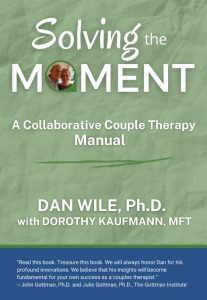On Couple Therapy
- An especially good account of Collaboration Couple Therapy. A slightly reorganized version of a chapter published in 2002 in The Clinical Handbook of Couple Therapy 3rd Edition, edited by Alan Gurman and Neil Jacobson.
- A Delicate Balance: Anger is Just a Sentence Away, and so is Intimacy. The recovery conversation that would enable the couple to profit from the fight they just had.
- How Conversations Cure: The Shift from Fighting to Collaborating. Ways for a therapist to help create this shift.
- Opening up a Second Level in the Relationship
How to recover from a fight with your partner by creating a metalevel from which to talk about it. - A Brief Description of Collaborative Couple Therapy
In my contribution to a panel discussion, I presented this whirlwind account of the major principles of the approach. - A View From Above the Fray
An example of creating a platform from which partners can recover from a fight they just had. A modified version was published as a sidebar to “Feeling like partners” by Philip A. Cowan, Carolyn Pape Cowan, and Neera Mehta in Greater Good, Fall/Winter 2005-06. http://peacecenter.berkeley.edu/greater good.html
On Psychotherapeutic Theory
- Kohut, Kernberg, and Accusatory Interpretations
Describes how accusatory interpretations have given interpretation a bad name. This article was originally published in 1984 in Psychotherapy: Theory, Research, Practice, and Training, 21(3), 353-364.- Psychotherapy by Precedent: Unexamined Legacies from Pre-1920 Psychoanalysis
Describes how certain psychoanalytic beliefs and techniques have outlived the theory that gave rise to them. This article was originally published in 1985 in Psychotherapy: Theory, Research, Practice, and Training, 22(4), 793-802.- Personality Styles and Therapy Styles
Describes how clients’ personality traits affect their plan of cure for the psychological problems they have and the type of therapy they seek. This article was originally published in 1975 in Psychotherapy: Theory, Research and Practice, 13(4), 303-307.- The Therapist’s Major Dilemma
As part of my reaction to a debate in the American Psychologist, I ask at what point to stop validating a client’s experience and step in to try to produce change. I answer that validating a client’s experience is the way to produce change.


